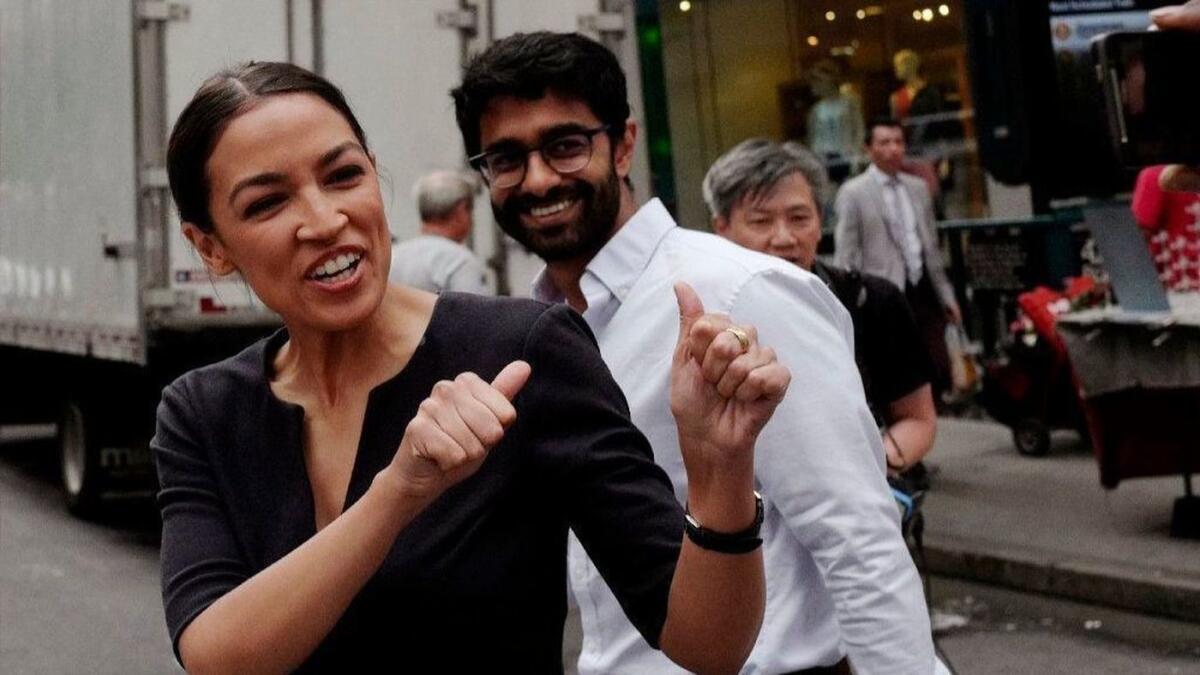Op-Ed: Alexandria Ocasio-Cortez’s L.A. fundraisers were more about raising consciousness than money

- Share via
Alexandria Ocasio-Cortez, the probable next member of Congress from New York’s 14th District, barnstormed through Los Angeles with two fundraisers last week. But I hesitate to call them fundraisers. They weren’t held on the Hollywood Hills balcony of some showrunner for prestige TV. They weren’t showcases for one woman’s singular vision to personally revive the American left and solve the nation’s challenges.
They were organizing meetings — the kind that used to be held in the back of union halls and community centers when we still had unions, and communities. Ocasio-Cortez presented herself not as the savior of a moment but a small part of a movement, amplifying the actions of everyday activists toiling in relative obscurity on the ground. “This work doesn’t rely on any one person,” Ocasio-Cortez said at one event. “But the work needs every one person to act. That’s what collective movement-building is all about.”
When Ocasio-Cortez defeated Joe Crowley, the No. 4 Democrat in the House leadership, it symbolized the left’s resurgence. But that restoration cannot be completed on the back of one representative or or even one president. If the left wants to rise, it must enlist millions into the fight, and Ocasio-Cortez is one of a growing number who seems to understand that. Look out, conservatives.
The Los Angeles Theater Center was decked out Thursday like a trade show for left politics. Booths featuring community organizers, single-payer healthcare enthusiasts, and direct action groups like Occupy ICE handed out literature and chatted up attendees. Off in the corner they were selling Ocasio-Cortez T-shirts, but community groups were far more prominent. Many of these groups met with Ocasio-Cortez that morning at a breakfast organizing meeting.
If the left wants to rise, it must enlist millions into the fight, and Ocasio-Cortez is one of a growing number who seems to understand that.
When the program began, Ocasio-Cortez took a seat on stage while presenters spent an hour pitching the crowd of more than 500 on their projects. The Alliance of Californians for Community Empowerment asked for support for Proposition 10, which would repeal the statewide ban on local rent control efforts. Trinity Tran of Revolution LA gave a rousing speech about the historic movement to create a public bank for city tax revenue, another issue that goes before voters in November.
Finally, Ocasio-Cortez took the mic. She explained her role as “half student, half cheerleader,” supplying a platform for community voices and learning about their concerns.
Ocasio-Cortez was an engaging speaker, but she used those gifts to direct people to the “uncelebrated and un-talked about” work of change – her eight months on the campaign trail knocking on doors, talking to neighbors, building coalitions at the community level. She talked of a “moral infrastructure,” constructed to engage the broad mass of people who may have tuned out the horse race, but would be willing to join the causes of single-payer healthcare, tuition-free college, and an end to the war on drugs and mass incarceration.
That nonvoter swing vote, not those who oscillate from Democrats to Republicans, has the power to transform politics. Ocasio-Cortez increased turnout in her congressional district by 68% compared to the last midterm primary election. “They’re not voting because they don’t feel like anyone’s fighting for them,” Ocasio-Cortez told an audience of 750 at the First Unitarian Church in Koreatown on Friday night. “When we take that risk and fight for them they will come out for us.”
Enter the Fray: First takes on the news of the minute from L.A. Times Opinion »
The Koreatown event was organized by the Democratic Socialists of America, whose ranks have swelled to more than 47,000 in the wake of the Trump election. The discussion between Ocasio-Cortez and two Democratic Socialist leaders doubled as a membership drive and a chance for the group to tout its priorities, including Prop. 10 and the public banking initiative. “Movements are not possible without our collective power,” said Rachel Reyes of the Democratic Socialists.
The discussion again stressed organizing as the solution to an atomized public square. “It’s our job to let people know they are not alone,” Ocasio-Cortez told the crowd. “Not alone in their poverty, not alone in their identity, not alone in their right to dignity.” She highlighted the loneliness of movement building, how it can initially lead to failure when opposing powerful forces. “But as long as you feel you’re doing the right thing, it’s worth doing.”
You hear a lot of politicians say that the power of the people is greater than the people in power, that change comes not from the top down but the bottom up. They usually say this at a campaign stop when they need votes, before returning to Washington and tuning the public out. Ocasio-Cortez is a person soon to be in power who identifies as one of the people, someone who started from the bottom and is determined to remain there, because she actually believes it to be the center of transformational change.
This process of collective organizing matches the society that Democratic Socialists would like to see, with people relying on and showing responsibility for each other. There is humanity in working together for a common goal. And there is grace and generosity in a movement defined not by a few charismatic leaders, but by ordinary people from all walks of life doing the work.
David Dayen is a contributing writer to Opinion.
Follow the Opinion section on Twitter @latimesopinion or Facebook
More to Read
A cure for the common opinion
Get thought-provoking perspectives with our weekly newsletter.
You may occasionally receive promotional content from the Los Angeles Times.









